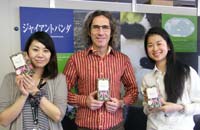FairWild certified licorice tea on sale in Japan
Tokyo, Japan 4th June 2013—Nine months after its launch in the UK the Peppermint & FairWild-certified Licorice Tea produced by Pukka Herbs Ltd is now being retailed through WWF’s Panda Shop in Japan.

It is the second brand of tea with FairWild-certified ingredients on sale in Japan, joining a range of herbal teas produced by US manufacturer Traditional Medicinals Inc.
“Japan is a major consumer of products made from medicinal and aromatic plants and the availability of FairWild-certified products on the Japanese market is key to raising awareness among consumers of the importance of sustainability in the use of wild plant ingredients,” said Kahoru Kanari, Senior Programme Officer with TRAFFIC.
Dr Ayako Toko, Head of TRAFFIC in Japan noted: “The involvement of the private sector is very important for the sustainable use of wild plants. We believe the Japanese market is slowly moving towards seeking both economic and biological sustainability and we will endeavour to ensure more Japanese companies appreciate the benefits of using FairWild-certified ingredients.”
In Japan, licorice is used mainly in medicine—especially the traditional Kampo system, of which about 70% of prescriptions contains licorice. It is also used as an ingredient of cosmetics. The licorice in the Pukka Herbs Ltd tea originates from Kazakhstan, and was especially selected because it meets the FairWild Standard for sustainability and fair trade.
The FairWild Standard was developed by TRAFFIC, WWF and other FairWild Foundation partners to ensure those collecting wild plant ingredients harvest the produce sustainably and receive a premium price for their efforts.
In advance of the launch, Tim Westwell, co-founder of Pukka Herbs, visited WWF and TRAFFIC’s Tokyo office to talk about the company’s use of FairWild certified products and the production of FairWild-certified tea in particular.
Nariko Sata, manager of WWF Japan’s Panda Shop said: “We are pleased to introduce a new licorice tea with FairWild-certified ingredients to our customers. The shop aims to promote our 'One Planet Lifestyle' goal through wise consumption of natural resources. This new FairWild-certified product will be promoted as a good practical solution for achieving this.”
In 2012, Licorice was named medicinal plant of the year in Germany, chosen because of its paramount importance to human well-being world-wide. Licorice is an important ingredient, “gan cao”, in traditional Chinese medicine (TCM), while in Germany, Europe’s major consumer and trader in medicinal plants, around 500 tonnes of licorice are imported each year, 100 of them consumed domestically in medicinal teas. The root is also used in confectionary and in many herbal liqueurs.
The liquorice plant is a woody shrub in the Fabaceae (pea family), and grows up to a metre tall. The three species most commonly used originate from Asia, with relatives found across the Mediterranean to East Asia, the Americas and Australia. Only the root of licorice is utilized, from which a wide variety of compounds—400 to date—have been isolated. Among the most important is glycyrrhizin, a chemical that possesses almost 50 times the sweetening power of cane sugar.



